Binance Exchange Security 2024: Is Binance Still Safe?

Binance stands as the leading global cryptocurrency exchange, renowned for its unrivalled security measures, extensive range of altcoins, and a highly efficient trading engine. Serving as a comprehensive platform, Binance caters to the diverse needs of crypto enthusiasts, providing a vast selection of crypto products all in one place. There's a reason Binance is hailed as the King of Crypto Exchanges. 👑
Is Binance safe? It's a great question because we regularly hear about security breaches and insolvencies on crypto exchanges worldwide, despite improvements over the years. Although most reputable exchanges focus on improving security, hackers have become increasingly sophisticated at finding vulnerabilities.
Binance is the world's leading cryptocurrency exchange by trading volume. It has over 150 million registered users, and, on average, its 24-hour trading volume is over $25.20 billion (March 2024). In addition, the Binance trading platform has the lowest fees in the crypto market.
That sounds great, but is Binance safe?
According to Immunefi, in 2023, the web3 ecosystem lost over $1.8 billion:
- $1.70 billion was lost to hacks in 2023 across 247 specific incidents
- $103.4 million was lost to fraud across 110 specific incidents
With regards to Binance, a bug in a smart contract on the Binance Smart Chain caused a loss of $570 million to Binance in October 2022. Thankfully, Binance had insurance (SAFU) for such an eventuality and fully reimbursed its customers.
Suppose you're considering joining Binance and want to know whether its security features make it a safe trading platform for crypto traders. In that case, this Binance exchange security article outlines what you can expect from opening an account with Binance and determining for yourself if Binance's safety protocols meet your expectations.
Binance Quick Summary
Established | 2017 |
|---|---|
Two-Factor Authentication | Yes |
Secure Asset Fund (SAFU) | Yes |
Proof of Reserves | Yes |
KYC/AML | Yes |
Customer Support | 24/7 |
Maker / Taker Fees | 0.10% Max |
Mobile App | Yes |
Crypto Wallet | Yes |
Trading Pairs | 1600+ markets |
Cryptocurrencies | 350+ |
Native Token | BNB |
Launchpad | Yes |
Crypto Debit Card | Yes |
Changpeng Zhao founded Binance in China and the company now has over 50 offices worldwide, but the current headquarters are unconfirmed. Zhao, better known by his initials CZ, resigned as CEO in November 2023 after pleading guilty to a money laundering charge by US authorities.
At the 2020 ConsenSys Ethereal Summit, Changpeng's response to an interviewer's question about Binance's HQ location was:
"Well, I think what this is is the beauty of the blockchain, right, so you don't have to … like where's the Bitcoin office, because Bitcoin doesn't have an office. Wherever I sit is going to be the Binance office. Wherever I need somebody is going to be the Binance office." (Source: Coindesk)
Though the lack of transparency could be a concern, overall, we're considering how Binance secures digital assets for its customers. For that information, the headquarters location is not a significant factor.
While trying to find Binance's headquarters is like playing a game of Whack-A-Mole, you may find it helpful to note that Binance has offices in cities like Bahrain, Dubai, and Paris, and will soon announce the location of a single global holding. Binance has also registered its legal entity in Italy and has plans to expand its local team in the area. According to Craft.co, Binance's corporate headquarters is located in the Cayman Islands, with additional strategic locations in Vilnius, Lithuania, and Malta.
In the next section, we explore the key features and learn more about the Binance platform.
This article focuses on whether Binance is safe and secure. If you want to learn more about the products, features, and functions Binance offers crypto traders and enthusiasts, you can read our in-depth review of Binance to find out more about the platform.
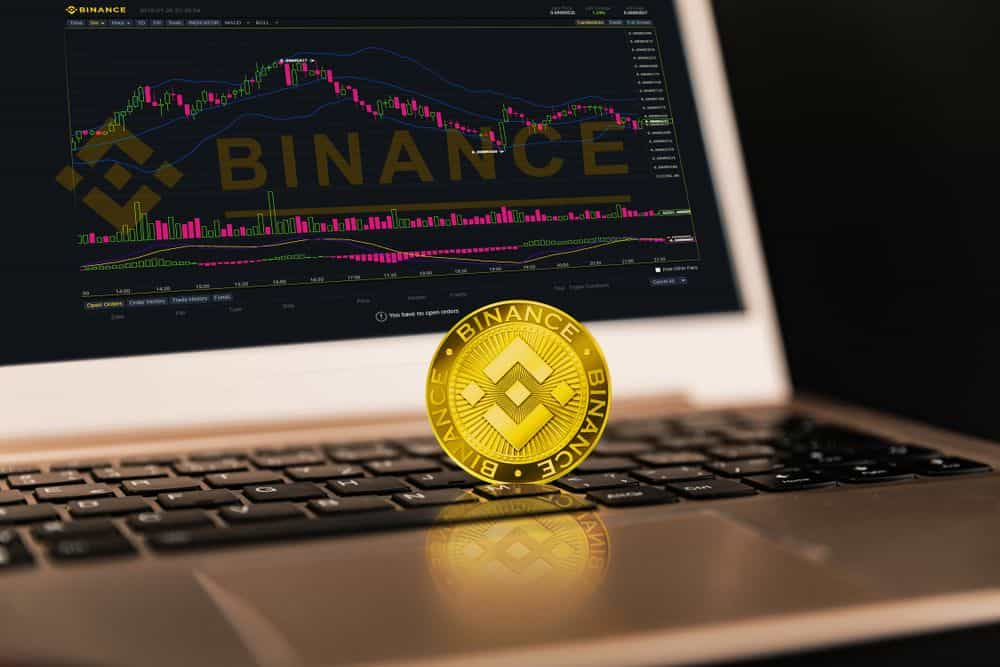
We also have in-depth articles and guides covering various aspects of the Binance Exchange that you may find interesting:
- How to Sign Up on Binance: A Step-by-Step Guide
- Binance App review: Mobile Trading on the Go
- Binance vs Binance US: An In-Depth Look
- BNB Coin: The Utility Coin for Binance
- Binance NFT Marketplace Review
- How to Buy Bitcoin on Binance
- A Guide to Trading on Binance
- Binance Earn Review
The Key Features of Binance Security Measures are:
- SAFU (Secure Asset Funds) to reimburse users in the event of losses from a security breach.
- Two-Factor authentication 2FA
- Organizational Security
- Proof of reserves (PoR)
- Real-Time Monitoring
- Security Notifications
- Data Encryption
- Secure Storage
- IP Address Whitelisting
- Withdrawal Address Whitelisting
- API Whitelisting
- Anti-Phishing Email Codes
Note: Users located in the US and UK are not supported.
What is the Binance Exchange?
Binance is the largest crypto exchange worldwide by the number of users and trading volume. The professional trading platform has low to zero fees, over 1,600 trading pairs, advanced trading options for experienced crypto traders and offers Binance users spot and derivative trading (some countries are restricted, so always check first).
Binance has an exceptional choice of "Earn" products, including DeFi staking, auto-invest, liquidity farming and Binance Pool.
Other notable features include the following: -
- Binance US (For US-Based Users)
- Mobile app
- Crypto wallet
- Crypto debit card
- Institutional services
- 350+ cryptocurrencies
- Over 1,600 trading markets
- Fiat currency offramp services
- More features and crypto products than most crypto exchanges
How Does Binance Secure Crypto?
Not every crypto exchange takes care of account security as well as Binance. If you're new to the crypto market, you may wonder what would happen if the platform got hacked or some other catastrophic event caused the loss of your digital assets. Don't worry. In this section, you will learn the security measures Binance takes to protect your account.
Binance Key Security Features
Binance has several security features that contribute to protecting assets held on the platform by registered users.
Safeguarding Your Funds: The Secure Asset Fund for Users (SAFU)
In 2018, the Binance platform introduced a type of insurance fund referred to as the Secure Asset Fund for Users, or “SAFU” for short. The SAFU acts as an emergency reserve to protect user assets on the Binance platform. In the unlikely event that the platform gets hacked or anything causes users to lose digital assets (From Binance's perspective), the SAFU reimburses users.
The SAFU doesn't cover trading losses or any self-generated losses. For instance, it's your mistake if you lose your crypto wallet keys, mishandle your password, or cannot access your Binance account because you made a mistake. However, if a hacker gets your data or assets from a vulnerability in Binance's security systems, that is the responsibility of the platform to compensate your losses.
"Binance stores 10% of all trading fees in a secure asset fund to protect a share of user funds." (Source: Binance).
Two Factor Authentication
2FA isn't mandatory with Binance, but we highly recommend it as a security protocol. If someone accesses your password and you don't have 2FA enabled, you might only realize there was unauthorized access to your account when you log in and find your account balance is zero.
2FA acts as a stop measure, meaning that even if a hacker gets your password, they cannot access your account or make a withdrawal without also having access to your mobile device, which is also likely password-protected.
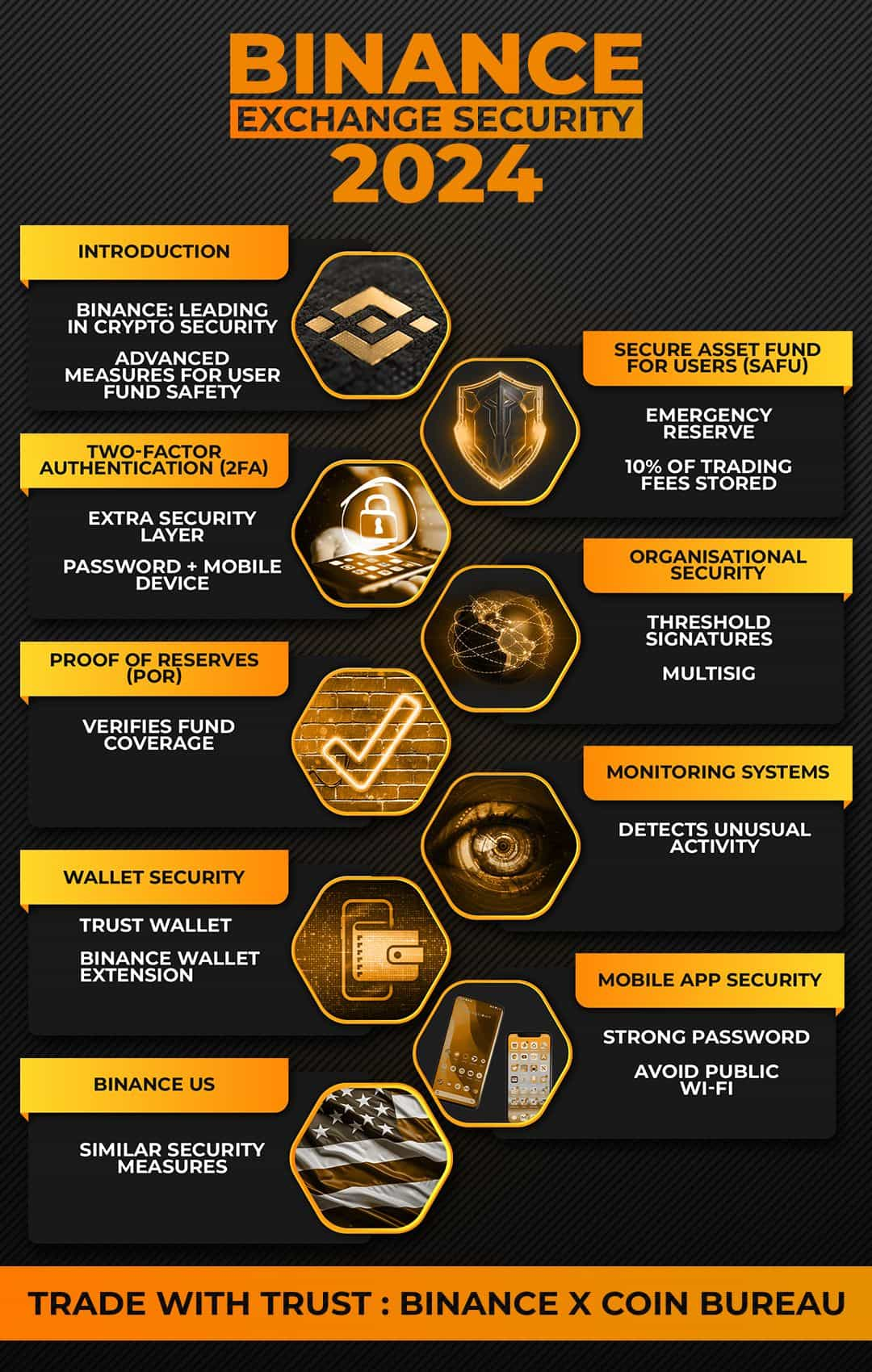
Organizational Security
Binance has several infrastructure features to ensure the integrity and safety of your funds (for the wallet and on the platform), including TSS (threshold signature schemes), a cryptographic protocol for distributed key signing and distribution, and multisig (multiple signatures).
Proof of Reserves (PoR)
"Binance has funds that cover all of our users assets 1:1, as well as some reserves." (Source: Binance).
In February 2023, Binance became the first centralised crypto exchange (CEX) to implement zk-SNARKS, which are zero-knowledge protocols to increase the security and privacy of user data during verification.
In addition, Binance made the code open-source to further benefit the entire crypto industry security.
Real-Time Monitoring
Binance's risk management system analyses every 2FA or password reset, withdrawal attempt, and email address change. If it considers anything unusual happening, Binance suspends withdrawals for 24-48 hours or longer, depending on your responses.
Binance employs sophisticated round-the-clock monitoring systems to ensure that there is no unusual activity on the platform.
Security Notifications
You can help Binance protect your account by adjusting your settings to maximum security. The notifications could help prevent losses on your account from theft.
"Secure From Day One: We safeguard user funds by securing our platform with strict protocols and industry-leading technical measures." (Source: Binance)
Data Encryption
Binance uses end-to-end encryption for all transactions and encrypts your personal information and data in storage.
Secure Storage
Binance stores most client funds and assets in offline, cold storage facilities.
Considering an average day for Binance generates $38 billion in trading volume, the platform must operate dynamically with hot and cold wallets to provide real-time liquidity and, at the same time, mitigate potential security risks. It's a complex procedure to track real-time assets through its internal ledger, but every transaction is verifiable via the Binance PoR system (proof-of-reserves).
"User assets are tracked entirely separately from Binance's corporate holdings." (Source: Binance)
Moving funds between Binance wallets serves various purposes. It has to navigate transactions of all sizes, whether a significant withdrawal by a "whale" or an institution, which could cause chaos in liquidity if Binance fails to handle the transaction promptly and correctly.
The objective is to maintain liquidity and security by ensuring sufficient funds remain for platform trading liquidity and the remaining funds transfer to cold (offline) storage.
The below chart gives a step-by-step visual insight into how Binance moves user assets on the platform.
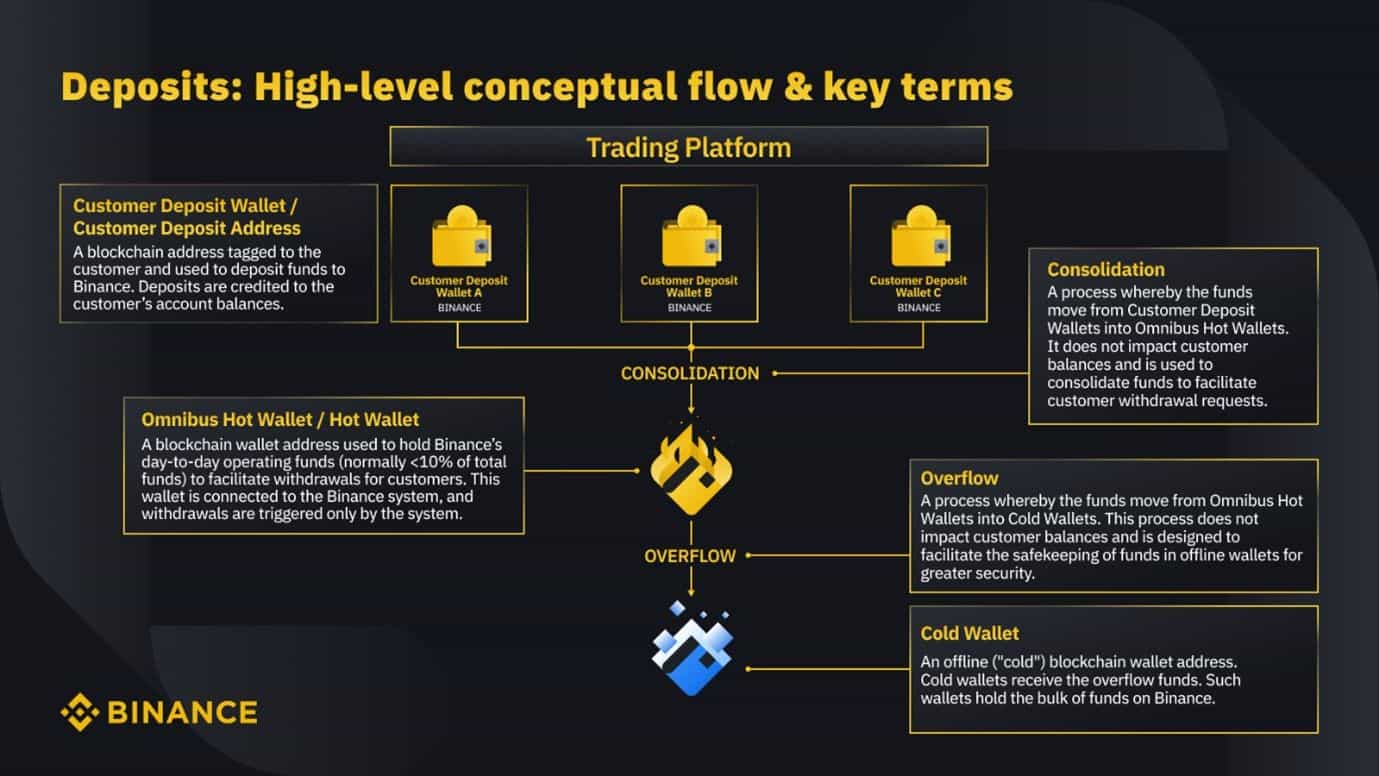
Periodically, Binance consolidates by transferring funds from deposit wallets into "omnibus hot wallets." This process helps Binance meet user withdrawal requests and minimise costs and wait times.
"Excess funds are moved from hot wallets to safe storage in cold or offline wallets. We refer to this process as overflow. Once a hot wallet runs low on funds, it might need a top-up from a cold wallet." (Source: Binance)
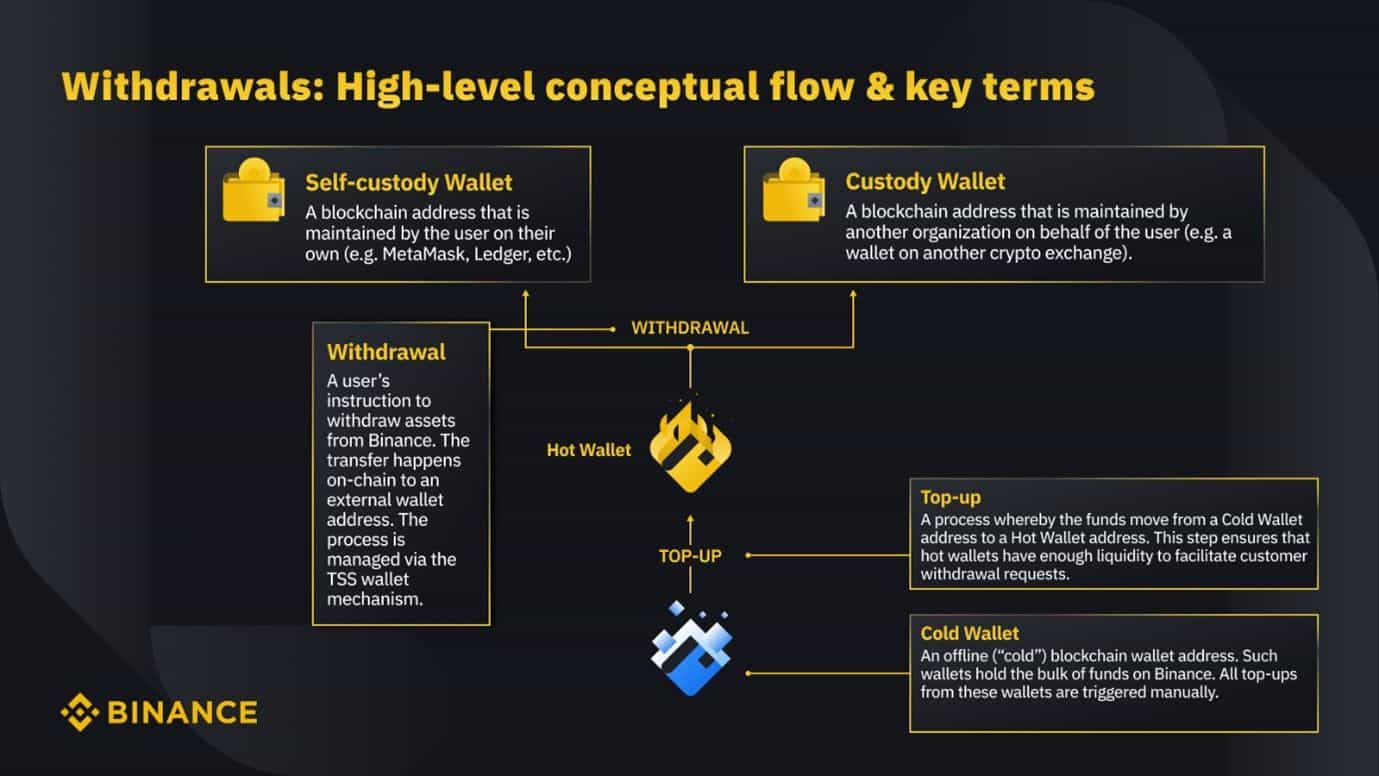
So, we've established that Binance takes significant measures to safeguard the platform, but let's discover what you can do to help take care of your digital assets.
How to Secure Your Cryptocurrency Exchange Account on Binance
Binance is excellent at providing a range of security options, but it helps if you also take measures to protect your account.
When you open a Binance account, you can restrict addresses to prevent devices from accessing your account. We recommend setting up personalised access control from the start. Whitelisting wallets and IP addresses help to protect your account.
Binance encourages safe sign-in protocols, such as 2FA, including SMS, email, hardware and app-based. Due to what is known as a Sim-Swap attack, most security professionals do not recommend using SMS, but opt for the more secure 2FA such as Google Authenticator or Authy on your mobile device or using a dedicated 2FA device like YubiKey.
It's advisable to use a super strong password along with a password manager. Use lower and upper case, digits and special characters. If you cannot remember your password without writing it down, that's a positive sign you have nailed a strong password, hence where a password manager can save the day.
Avoid using a generic password like Brian1234 or one you regularly use for other accounts.
By enabling notifications in your security settings, you can opt-in to receive security notifications from the Binance support team for login attempts. This can help identify if someone tries to get into your account pretending to be you.
Adding multiple layers to your account security is always a good plan.
"Binance maintains completely separate ledgers for user funds, pegged assets, and its own holdings. At any given moment, we know exactly how much money each of our users is entitled to, and we hold sufficient funds to honor any withdrawal request. And, again, it's all verifiable via the PoR system." (Source: Binance)
Binance Wallet Security
You can choose Binance's Trust Wallet, a popular self-custody wallet with over 60 million users, or use the Binance Wallet Chrome extension if you want to stick with Binance-approved self-custody wallet solutions.
As with other exchanges, Binance users have two choices: They can either keep their funds on the Binance Exchange or withdraw their assets to a self-custodial wallet. Most security-minded crypto users would highly recommend withdrawing any funds from an exchange that you don't intend to trade. You can find out why along with other crypto safety best practices in our Crypto Safety Guidelines article.
Trust Wallet is a fantastic choice for mobile crypto wallets, but if you want the most secure crypto storage wallets available, you may want to check out our article on the Top Hardware Wallets.
Regardless of the wallet you choose, always choose a strong password combining letters, capital and lowercase, digits and special characters. If you can opt-in for biometric access, all the better, as nobody has your face or fingerprints.
When setting up your wallet, write the seed phase somewhere safe and secure. Without this recovery phase, you could permanently lose access to your wallet. (We cover this in detail in the Crypto Safety Guidelines article above)
2FA might seem a pain when you want to access your wallet fast, but it's extra security for stopping others from fast access to your crypto holdings.
Binance Mobile App Security
The same rules apply to the Binance mobile app as to a crypto wallet. We've all become blasé about using our phones in public and trusting security, but our relaxed approach to trading or buying crypto on mobile apps can be dangerous.
After you download the Binance mobile app, consider the following 8 security tips: -
- Install reputable antivirus protection that offers passcode app locking.
- Update your phone regularly.
- Install a 2FA authenticator such as Google Authenticator or Authy.
- Lock the Binance app if possible.
- Have a lock screen password on your phone, so nobody can access the apps, even if you lose your mobile.
- Consider installing a VPN for added encrypted security.
- Ideally, don't use the Binance mobile app using public WiFi.
It might seem a hassle to consider implementing extra security, but protecting your crypto assets is a priority if you want to stay in the crypto market for the long term.
Binance vs. Binance US
After the United States cracked down on crypto rules and regulations, US regulators classified many Binance assets as "securities", part of a financial category including futures, stocks and bonds. As a result, Binance created a US-specific platform for traders and crypto investors based in the United States called Binance US.
Customer support is still 24/7 via email and online chat.
Although Binance US is available to most states, it is not available to Hawaii, Texas, New York and Vermont. Binance is working to implement compliance requirements globally, as are many cryptocurrency exchanges.
Fees, trading, and minimum deposit ($10) are the same, and both platforms support desktop, mobile and web trading.
Binance US supports USD, EUR and AUD, among others, and over 120 cryptocurrencies. You can read our Binance vs. Binance US review for a more detailed comparison.
In conclusion, besides less liquidity, fewer services, and the method of customer support, Binance and Binance US both prioritise user account security and customer fund security, so the same guidelines apply throughout this article.
So, Is Binance Safe?
We began this article by asking, "Is Binance safe?" Of course, the definition of safe can be subject to individual perspectives. Our objective was to determine if depositing funds with Binance is secure, using the trading platform safely and withdrawing cryptos to your wallet.
In addition, we looked at the security of the Binance mobile wallet and app.
Whilst we always encourage you to adopt a responsible approach to securing your digital assets, Binance provides a good selection of tools to help you do so. The peace of mind from knowing Binance has a SAFU in place is a big bonus.
In November 2022, as the crypto market plunged, Changpeng Zhao (CZ) topped up the Binance SAFU to $1 billion to provide additional security to Binance users during the challenging bear market. In his tweet, Changpeng stated that BNB and BUSD accounted for $700 million and $300 million for the BTC address.
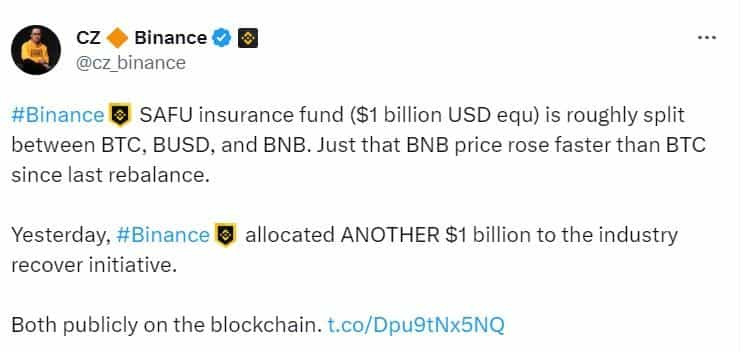
In recent years, regulators worldwide have accused Binance of compliance issues and not responding to requests to provide essential information. It's tricky to get a clear picture as most of it has been mere hearsay, and many in the crypto community feel it is nothing more than a witch hunt amidst the ongoing Chokepoint 2.0, but it is important to note that these accusations against Binance do exist. However, as Binance has over 150 million users worldwide and is by far, the largest crypto exchange in the world, they're clearly doing a lot right by its customers.
Trust Wallet and the Binance Wallet Chrome extension are popular self-custody wallets downloaded by millions of users. If you follow the guidelines for protecting your digital assets, either wallet is acceptable. The Binance app is also popular with traders and investors on the go.
We hope that you now have a better understanding of the safety and security of Binance. Please read our in-depth Binance review if you would like to know more about the largest exchange worldwide.
Alternatives to Binance
Binance is a major player in the exchange space and a great consideration for anyone looking to trade crypto. However, some great alternatives are also worth checking out.
Bybit is one of the leading exchanges for serious traders with a second-to-none trading and matching engine which has helped attract some of the most professional traders in the industry. Bybit is also our top pick for anyone looking to get into copy-trading or participate in trading competitions. You can learn more in our Bybit Review.
OKX is another fantastic exchange, at the cutting edge of Web3 integration and innovation with their OKX web wallet, the OKX Chain, NFT marketplace and more. OKX has also attracted highly skilled traders from all over the world and has plenty to offer crypto traders. You can learn more in our OKX Review.
If you are looking for the most simple way to swap cryptocurrencies, then check out SwissBorg. SwissBorg is a leading European exchange and our #1 pick for beginners. Being fully licensed and regulated, SwissBorg offers “one-click” trading and investment products, great for hodlers who need access to simple swaps and ways to earn APY. Note that SwissBorg is not suitable for technical analysis traders as there is no charting functionality. Check out our SwissBorg Review to learn more.
Frequently Asked Questions
We believe so, Binance is one of the most secure platforms in crypto. Binance made an excellent decision in 2018 by incorporating the SAFU, which increased user confidence in the exchange.
Hundreds of cryptocurrency exchanges are available, and we understand the most critical element of deciding which one to use depends on whether it is a trusted platform.
As well as the back-end security support, Binance also helps you to secure your account by adjusting your settings to include multiple layers for access.
The Binance app lets you buy, sell, stake, and trade cryptocurrencies from a mobile device. After verifying your account, you can use the app to deposit funds, trade and transfer cryptos, or even pay for goods and services with your digital assets.
To download the app for Binance, you can visit the Apple or Google store or scan the QR code on the Binance website.
It's advisable to store your crypto in a self-custody crypto wallet rather than storing them on a centralised exchange. You can choose an online desktop wallet, mobile wallet, or an offline cold storage hardware wallet. Binance has a Chrome extension wallet or Trust Wallet.
Yes, Binance is the #1 exchange in the world in terms of trading volume. Binance has good liquidity for trading, industry-leading low fees, many crypto-centric products, and a wide variety of crypto assets, products, and trading features.
Binance is often considered one of the safest exchanges in the world if you consider the level of security. If the exchange crashed or a hacker stole assets or funds, the SAFU reimburses its users from the $1 billion fund. Not every platform has an insurance fund in place.
Binance encrypts data end-to-end, monitors user activity and suspends withdrawals if it suspects fraudulent or suspicious activity. The platform has a strict KYC/AML policy and takes exceptional measures to protect against malicious attacks.
Binance US requires new users to provide an SSN for regulatory reasons and to help prevent fraudulent activity. Binance assures users that it does not store their social security number details, though some users are uncomfortable sharing them. All communication with the Binance platform is SSL encrypted.
Binance is the world's leading cryptocurrency exchange by volume and registered user numbers, and Coinbase exchange is the second. Both established platforms prioritise account security with 2FA, cold storage and encryption.
Coinbase has crime insurance to protect against potential theft from a cybersecurity breach. On an undated Coinbase help page, the platform disclosed that "Our custodial accounts have been established in a manner to make pass-through FDIC insurance available up to the per-depositor coverage limit then in place (currently $250,000 per individual)."
Coinbase is typically a starting point for crypto beginners because the interface is user-friendly and easy to navigate.
To help you decide on the best platform, read the in-depth Binance vs. Coinbase comparison review.
US citizens cannot use Binance. Instead, they can use the US-specific Binance US website for trading, buying and selling cryptocurrencies.
Disclaimer: These are the writer’s opinions and should not be considered investment advice. Readers should do their own research.


